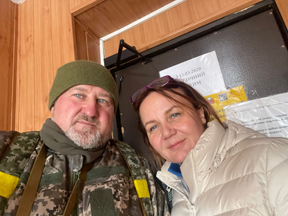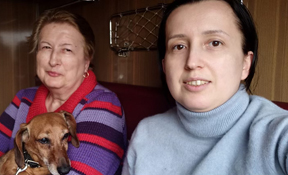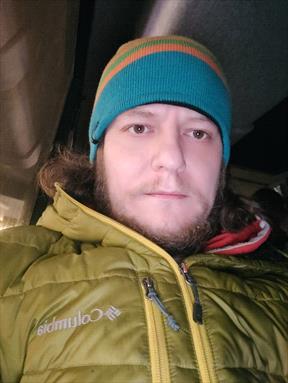
Photo courtesy of Dr. Yurii Danyleiko
Dr. Yurii Danyleiko and his wife, Natayla, are determined to stay and defend their home in Odessa.
Warning sirens didn't sound until after the explosions.
Dr. Andrii Klietsov, 41, was sheltering last night in his veterinary practice in Sumy, when he jolted awake to a phone call from his wife, Natalia.
"She was crying and my children were shocked, I heard explosions over the phone, and then I heard explosions near me," Klietsov said this morning.
The owner of three veterinary practices in Sumy, 30 miles from the Russian border in northeastern Ukraine, Klietsov has been communicating with the VIN News Service over the messaging platform WhatsApp since March 1.
Twelve days since Russians invaded Ukraine on Feb. 24, Klietsov, like so many of his compatriots, refuses to bow to the pressure. He has tried to keep open at least one of his practices. With the help of 20 employees, he is caring for animals as well as people injured by the war.
The United Nations estimates that more than 400 civilians have died in Ukraine since fighting started. Russia's overnight airstrikes on Tuesday killed at least 21 people in Sumy. Among the casualties is a former classmate of Klietsov's, who died alongside his wife and two children, according to social media reports. A third child of the couple is missing.
Disaster relief in Ukraine
* Red Cross
* UNICEF
* World Central Kitchen
* Equiwent
* International Fund for Animal Welfare
The Federation of Veterinarians of Europe, meanwhile, has launched an online hub to coordinate aid by European veterinarians to help Ukrainians and their animals.
The website features a disclaimer: “Please note that these resources are not validated or verified from our side. In view of the urgency, we wanted to list a range of different ways to help. No responsibility is taken.”
Klietsov is determined to keep his family together in Sumy, even though his wife has wanted to flee Ukraine since the conflict began.
Abandoning the city, Klietsov believes, "would be a betrayal."
In several conversations this week, Klietsov told of diminishing food supplies, fuel and morale. Armed only with resolve, Klietsov spoke of making do with what he has to protect his family.
During a moment of levity, he quipped, "I have a scalpel and I can do castration."
Klietsov said his country needs more support from the U.S. and Europe to defend itself against Russia. Echoing Ukraine President Volodymyr Zelenskyy, he said, "One thing that's needed is to close the sky over Ukraine," referring to establishing a no-fly zone, a step that outside countries widely perceive would dangerously escalate the conflict.
He considers sheltering from airstrikes to be futile. "If you look at the bomb pits, the basement won't help," he said.
'We defend our land'
Four hundred fifty miles to the southwest in the port city of Odessa, the owner of a large veterinary hospital, Dr. Yurii Danyleiko, dresses in fatigues while working as a medic to the wounded.
In addition to plying his skill as a healer, Danyleiko shares his views and experiences with foreign news media. Members of his unit met today with journalists from the U.S. television news network PBS, he told VIN News via WhatsApp.
He reported: "We've had several air raids today. We have nowhere to run. We defend our land."
The day before, he reported that four rockets fell on the city, and Ukrainian forces sank a Russian warship on the Black Sea.
"This is scary. We are scared for our children and our grandchildren, for those whom we love," he said. "We have never experienced anything like this, and could not even imagine what it could be."
Danyleiko's family has remained in Odessa all the same. His sons Nikolai and Maxim, both veterinarians, continue to practice. "Now during the bombing and wartime, my sons work and save the lives of animals, because they also fall under the bombing and also get injured," he said.
Tetiana and mother

Photo by Dr. Tetiana Khramova
Dr. Tetiana Khramova fled Kyiv on March 1 with her mother, Lyudmila (left), and her dachshund. They spent the 20-hour ride to Romania in a small train car with four other adults, two children and another dog.
Others in his family include his wife, Natalya, and daughter-in-law, Alexandra, also veterinarians. "I hope my granddaughter, Ira, she is now 5 months old, [becomes] a veterinarian," he said.
Life as a refugee
Dr. Tetiana Khramova, a 39-year-old veterinary surgeon, has ties to both Russia and Ukraine. She's made her home in Kyiv, living near her mother.
With air attacks on Kyiv, Khramova convinced her mother to join her last week on a train leaving Ukraine. Their 20-hour journey ended on Thursday in Bucharest, Romania, where she's now staying at the home of colleagues, accompanied by her elderly dachshund, who cried the entire trip.
Recounting events of the past two weeks, Khramova recalled how the Russian invasion began on Feb. 24 near the end of her overnight shift at a specialty veterinary practice called NeuroCare.
"I hadn't slept because we had a patient with seizures, and that morning, I read a post from my friend from Kharkiv [a border city among the first to be attacked], and called my mom," she said. "I asked her to pack papers, drugs, etc., to be ready to leave the house."
She left work as her bosses arrived that morning. They remain in Kyiv. "They haven't left because there are some animals still there and it's quite hard and dangerous to move around the city," she said. The clinic, a referral practice in neurology, rehabilitation and surgery, is closed, however. She added: "Our colleagues mostly are at their houses, they can't get to work and also can't leave their pets."
Khramova and her mother were unable to leave right away. For several nights, they slept in the corridor outside her apartment or in the building's basement.
On March 1, a colleague drove them to a nearby train station. "At that moment, they were bombing our TV tower. Fortunately, it was rather far from us. The closest was an attempt to bomb the Ministry of Infrastructure, but they hit an apartment tower two minutes from our house. We were outside and felt like they were going to kill us."
When they arrived at the border, Romanians met them with food and supplies. "They were more than welcoming," she said gratefully.
War protester leaves Russia, ponders risk of returning
Dr. Andrei Albul

Photo by Dr. Andrei Albul
Dr. Andrei Albul, a veterinary neurologist in St. Petersburg, posted to Facebook after being arrested and loaded into a police detention vehicle for protesting Russia's invasion of Ukraine. He captioned it, "A new type of transportation for me #nowar."
Right now, Dr. Andrei Albul is contemplating his future from a hotel room in Turkey. The veterinarian from St. Petersburg, Russia, left there with his wife and their young daughter following his arrest last week at a protest.
The 39-year-old veterinary neurologist joined hundreds of people on Wednesday in Gostiny Square in St. Petersburg to protest Russia's invasion of Ukraine. He was among those who were rounded up by police.
"People were standing in groups with slogans about 'war have to be stopped' and 'we are with Ukraine,' " Albul recalled by WhatsApp. "Then a policeman using loudspeaker told that our meeting is illegal, and we had to go away. After that, OMON [Russian special forces] surrounded us and start to put people in bus. If someone tried to run, he or she was punched and put into the bus. In my bus it was 30 to 50 people. Then we all were delivered to police."
After about six hours in custody, Albul was released and given a date to appear in court. His first instinct was to leave the country with his family. Now outside of Russia, he's unsure about his next move. These are the possible scenarios he imagines:
"1. Police machine will not touch me and I will still be able to work. 2. They will arrest me and after that I can spend in jail from 15 days to 15 years, depending on what will they present. Oh, and the third option is my violent mobilization into the army."
A fourth scenario is to put down roots in another country, perhaps Georgia, where he can practice. "I've been in lectures in Georgia, and I have few friends there," he said. "Besides, some my colleagues are going to go to Georgia, and I think I should help them."
Albul was born in the former Soviet republic of Moldova and moved to Russia, where he graduated from the St. Petersburg State Academy of Veterinary Medicine. While Albul opposes the government's decision to invade Ukraine, he loves the country and its people.
Asked whether he senses much support in Russia for military action in Ukraine, he said, "I can't tell you how many people support war, because there is no freedom of speech in Russia, so those who support the war can speak freely, and those who don't are afraid to speak."
Albul doesn't take issue with Russians who support President Vladimir Putin and his military campaign. "The main problem are those who think that war and Putin and police repressions are not their problem," he said.
Critics of Putin's policies are continuing to protest, but the mood has shifted, Albul said:
"They are afraid."
This article has been changed to update the resources on relief efforts for the Ukrainian veterinary community and animals affected by the conflict.